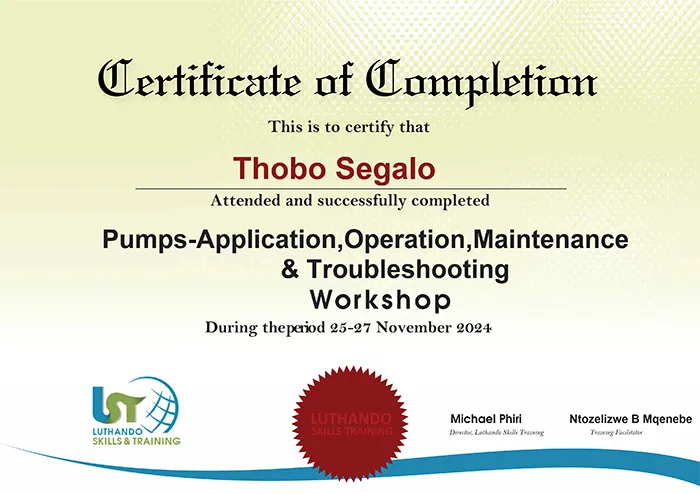Cost: R8,999 per delegate
Introduction
It is universally recognised that for any company to succeed it must take a proactive approach to risk management. Over the last few years Companies and a number of Countries legislators have been focusing on Process Safety as a method to reduce the risks posed by hazardous industries. Process Hazard Analysis (PHA) is recognised as being a critical tool in the implementation of a successful risk management system.
As Hazard and Operability (HAZOP) studies are now recognised world-wide as being the qualitative risk assessment methodology of choice in the Process Industries, there will be additional focus on this specific aspect of Process Hazard Analysis.
Objectives
Delegates attending this Luthando Skills Health & Safety training course will:
- Understand the concepts of Risk Assessment and Risk Management
- Understand the estimation and evaluation of risks – Qualitative, Semi-Quantitative and Quantified Risks
- Techniques for Hazard Identification and Analysis – Check-Lists, Risk Profiling, HAZOP, FMEA and Task-Based Risk Assessment
- Cause-Consequences Analysis – The Role of Fault Trees and Event Trees in Accident Prevention
- Understand HAZOP studies their benefits and their short comings
- Understand the requirements of a Team Leader or Facilitator, scribe and team members during HAZOP studies
- Be able to facilitate a HAZOP study
Course Outline
DAY 1
Introduction to Risk Assessment
- Training Seminar Introduction: Delegate and Instructor Introductions; Training Seminar Objectives
- The Concepts of Hazards, Risk and Risk Assessment
- Methods for Risk Evaluation
- Integrating Risk Assessment within Risk Management
- Qualitative, Semi-Quantitative and Quantitative Risk Assessment Methodologies
- Feedback and Review of Day 1
Risk Assessment Techniques: HAZOP
- Introduction to Hazards Identification and Analysis Techniques
- Techniques for Hazard Identification and Analysis – HAZOP
- Where and When to Use HAZOP and the Requirements for a Successful HAZOP Study
- Team Composition for HAZOP Studies
- Guide Words and Process variables used for HAZOP Studies
DAY 2
HAZOP Leadership Techniques
- HAZOP Team Leader / Facilitator Requirements
- HAZOP Scribe Requirements
- Facilitating HAZOP Studies – do’s and don’ts
- Information required to allow Successful HAZOP Studies
- Review of Commercial Software used for HAZOP and Management of Change ‘MOC’
- Report Back and Review of Day 2
Consequence Analysis
- Theory Behind Fire, Explosion and Toxic Dispersion Modelling Utilised in Quantitative Risk Assessments
- Types of Fires and their Effects on People and Equipment
- Types of Explosions and their Effects on People and Equipment
- Review of Software available for Consequence Calculations
DAY 3
The Role of QRA
- Introduction to Quantified Risk Assessment “QRA”
- The Role of Event Tree Analysis in Scenario Development
- The Role of Fault Tree Analysis for Multi-causation Analysis
- Applications for ETA and FTA
- Failure Data for Use in QRA’s
- Societal Risk and Individual Risk
- Review of Software available for Quantitative Risk Assessments
- Report Back on Day 5 and Discussion
- Programme Review and the Way Ahead



